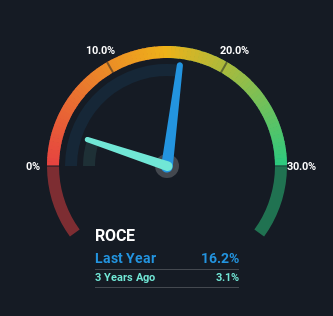- India
- /
- Auto Components
- /
- NSEI:ZFCVINDIA
ZF Commercial Vehicle Control Systems India (NSE:ZFCVINDIA) May Have Issues Allocating Its Capital
If we want to find a stock that could multiply over the long term, what are the underlying trends we should look for? Typically, we'll want to notice a trend of growing return on capital employed (ROCE) and alongside that, an expanding base of capital employed. Put simply, these types of businesses are compounding machines, meaning they are continually reinvesting their earnings at ever-higher rates of return. However, after investigating ZF Commercial Vehicle Control Systems India (NSE:ZFCVINDIA), we don't think it's current trends fit the mold of a multi-bagger.
What Is Return On Capital Employed (ROCE)?
Just to clarify if you're unsure, ROCE is a metric for evaluating how much pre-tax income (in percentage terms) a company earns on the capital invested in its business. Analysts use this formula to calculate it for ZF Commercial Vehicle Control Systems India:
Return on Capital Employed = Earnings Before Interest and Tax (EBIT) ÷ (Total Assets - Current Liabilities)
0.16 = ₹4.0b ÷ (₹30b - ₹5.4b) (Based on the trailing twelve months to June 2023).
Thus, ZF Commercial Vehicle Control Systems India has an ROCE of 16%. That's a relatively normal return on capital, and it's around the 14% generated by the Auto Components industry.
See our latest analysis for ZF Commercial Vehicle Control Systems India

In the above chart we have measured ZF Commercial Vehicle Control Systems India's prior ROCE against its prior performance, but the future is arguably more important. If you're interested, you can view the analysts predictions in our free report on analyst forecasts for the company.
The Trend Of ROCE
When we looked at the ROCE trend at ZF Commercial Vehicle Control Systems India, we didn't gain much confidence. Around five years ago the returns on capital were 23%, but since then they've fallen to 16%. However, given capital employed and revenue have both increased it appears that the business is currently pursuing growth, at the consequence of short term returns. If these investments prove successful, this can bode very well for long term stock performance.
On a related note, ZF Commercial Vehicle Control Systems India has decreased its current liabilities to 18% of total assets. So we could link some of this to the decrease in ROCE. What's more, this can reduce some aspects of risk to the business because now the company's suppliers or short-term creditors are funding less of its operations. Some would claim this reduces the business' efficiency at generating ROCE since it is now funding more of the operations with its own money.
Our Take On ZF Commercial Vehicle Control Systems India's ROCE
In summary, despite lower returns in the short term, we're encouraged to see that ZF Commercial Vehicle Control Systems India is reinvesting for growth and has higher sales as a result. And long term investors must be optimistic going forward because the stock has returned a huge 128% to shareholders in the last five years. So while the underlying trends could already be accounted for by investors, we still think this stock is worth looking into further.
While ZF Commercial Vehicle Control Systems India doesn't shine too bright in this respect, it's still worth seeing if the company is trading at attractive prices. You can find that out with our FREE intrinsic value estimation on our platform.
If you want to search for solid companies with great earnings, check out this free list of companies with good balance sheets and impressive returns on equity.
Valuation is complex, but we're here to simplify it.
Discover if ZF Commercial Vehicle Control Systems India might be undervalued or overvalued with our detailed analysis, featuring fair value estimates, potential risks, dividends, insider trades, and its financial condition.
Access Free AnalysisHave feedback on this article? Concerned about the content? Get in touch with us directly. Alternatively, email editorial-team (at) simplywallst.com.
This article by Simply Wall St is general in nature. We provide commentary based on historical data and analyst forecasts only using an unbiased methodology and our articles are not intended to be financial advice. It does not constitute a recommendation to buy or sell any stock, and does not take account of your objectives, or your financial situation. We aim to bring you long-term focused analysis driven by fundamental data. Note that our analysis may not factor in the latest price-sensitive company announcements or qualitative material. Simply Wall St has no position in any stocks mentioned.
About NSEI:ZFCVINDIA
ZF Commercial Vehicle Control Systems India
Engages in supplying systems for automotive and industrial technology in India and internationally.
Excellent balance sheet with proven track record and pays a dividend.
Similar Companies
Market Insights
Community Narratives



